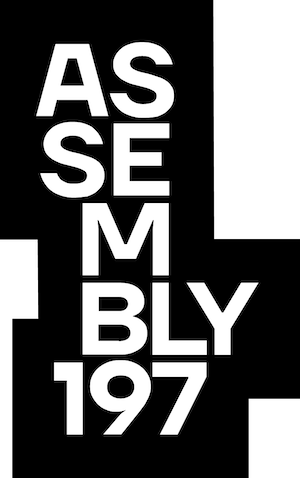ACCESS, INCLUSION +
HEALTH & WELLBEING PLAN
As a leader in the national arts sector, ASSEMBLY 197 recognises its position to enable all artists, including artists with disabilities, CALD, First Nations and gender diverse artists to play a full role within the cultural landscape and to engage critically with all that the organisation does.
To this end, ASSEMBLY 197 is developing an Access, Inclusion and Health and Wellbeing plan in conjunction with the accessibility upgrades of 197 Wellington Street. This plan will consider aspects listed below and adhere to the requirements of the Tasmanian and Commonwealth Anti-Discrimination Acts:
Access and Participation refers to barriers that prevent anyone with a disability from accessing and participating in the arts both as audiences and as participants
Arts and Cultural Practice refers to barriers that prevent artists with a disability from realising their artistic ambitions; and
Audience Development refers to raising the profile of work created by artists with disabilities.
HEALTH AND WELLBEING
The performing arts has long been associated with poor mental health management and outcomes across Australia (and internationally) from research published by Entertainment Assist (2016):
the majority of Australian entertainment industry workers express an overwhelming passion for their creative work.
there is a powerful, negative culture within the industry including a toxic, bruising work environment; extreme competition; bullying; sexual assault; sexism and racism.
there are high levels of mental health problems (greater than 40% among dancers) and ‘suicidality’. Barriers to seeking assistance include financial, lack of accessible resources, stigmas associated with asking for help, and poor support within the workplace.
In response to this research, we have engaged an external Employee Assistance Program to help us deliver our mental health and wellbeing policy/strategy at ASSEMBLY 197. We have created a workplace and community in which conscious prevention, protection, promotion and support of mental health is part of our everyday operations. We explore proactive preventative strategies to remove or respond to known and emerging risks to mental health and wellbeing.
Our guidelines/framework:
Prevent psycho-social work-related hazards by eliminating or reducing risk
Promote the positive aspects and protective factors of work
Promote positive mental health and wellbeing
Manage mental health and wellbeing problems effectively if and when they arise
Actions based on these guidelines are intended to support the psycho-social safety of:
Team and company members, leaders and managers, volunteers, presenters, collaborators and others who work on live performance sites and events
